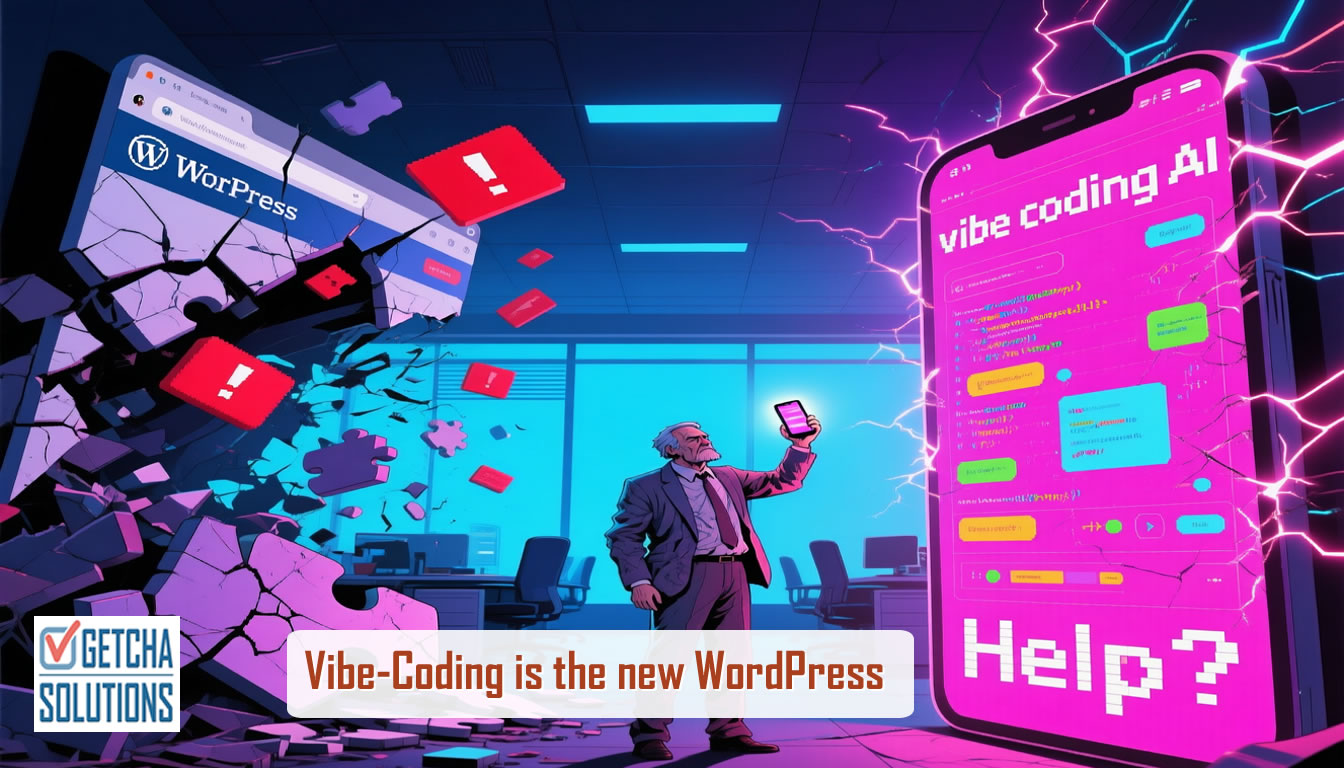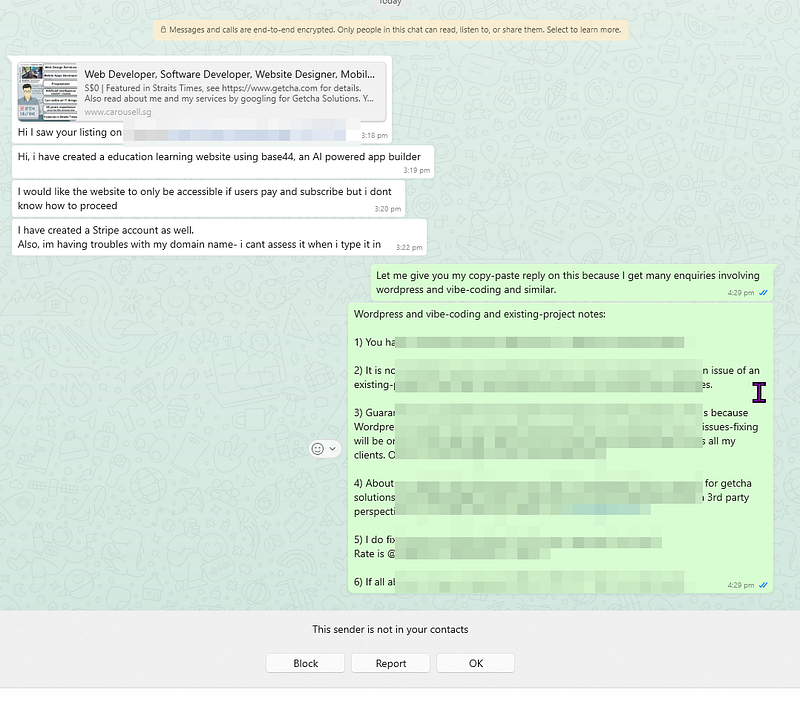Discover what a responsive website really means and why it’s crucial for Singapore businesses in 2025. Learn from a local web developer how mobile-friendly design boosts SEO, sales, and customer trust — with humor, real stories, and practical tips.
History repeats: Vibe-Coding is just Wordpress All Over Again. Beware.
Shiny new tools promise to replace developers every decade. Spoiler: they never do — and businesses always pay the price

The year was 2010. I had my first call from a WordPress client. Little did I know that that would be my first of many such hundreds of calls, all about businesses having their existing websites done in WordPress. And that now, it is somewhat “broken”.
Call after call, it was the same story. The same script. By them, and by my response.
“My current website is working fine. But, it JUST have this ONE issue.”
“My programmer is no more contactable.”
(Oh, this is so common, because a broken WordPress is not easy to resolve, due to some 1001 reasons. So, usually, they’ll somehow go missing.)
“I’d like to engage you to maintain my website.”
(Which is just another way of saying: my usually-working WordPress is now somewhat broken in some parts. So, if I hire you, you will fix them all as part of the job, right?)
I can go on and on with the permutations, but the baseline is all the same. They had hired someone or did it themselves, the WordPress way. Yes, it was low-cost, yes, it was fast to go Live. Yes, all was fine initially.
Then, stuff happens. Now, things are not easy anymore. Thus, they need a real developer to come in.
After about 2 decades of this same drama playing over and over a good part of my life, now I’m seeing a deja vu. And I feel it in my dutiful bones to let out this warning.
All business owners, and anyone else too, please take note.
Introduction — The Tech Deja Vu Nobody Asked For
Do you ever get that weird déjà vu feeling? Like you’ve seen this movie before, only the characters have changed their hairstyles and updated their slang?
That’s exactly how I feel watching the current vibe coding trend unfold. On the surface, it looks fresh, shiny, and revolutionary — “Now anyone can build apps without coding!” But if you’ve been in tech long enough (like me), it smells awfully familiar.
We’ve had this before. Its name was WordPress.
Back then, WordPress promised the same magic: “No need for technical skills, just point, click, drag, and you’re a web developer!” People believed it, jumped in, and built websites left and right. But soon, reality hit like a broken plugin update.
And now, with vibe coding, history is repeating itself. Only the names have changed.
The WordPress Effect — When Everyone Became a “Web Developer” Overnight
Let me take you back a bit.
There was a time when building a website meant knowing HTML, CSS, maybe a sprinkle of PHP, plus the joy of configuring databases. It wasn’t rocket science, but it required a baseline of actual technical knowledge.
Then WordPress entered the chat.
It was marketed as a “blogging platform,” but quickly morphed into a “make-your-whole-website-here” solution. Non-technical folks rejoiced. Suddenly, anyone could “launch” a website in a weekend. Business owners, hobbyists, and even your cousin who once fixed a printer decided they were “web developers” now.
It worked… until it didn’t.
- Plugins conflicted.
- Themes broke.
- Updates crashed sites.
- Hackers had a field day.
- Performance slowed to the speed of a sleepy snail.
Over the years, I’ve had countless clients come to me with these words: “We thought WordPress would be enough… but can you help us fix this mess?”
WordPress wasn’t evil. It was just misused — meant for simple blogs, but pushed into being a serious business backbone, even full-fledged CRMs! And the cracks always showed.
Enter Vibe Coding — The New DIY Dream
Fast forward to today.
The buzzword is vibe coding. Think low-code platforms, drag-and-drop app builders, AI-assisted snippets, copy-pasting from Stack Overflow with blind faith. The pitch: “No need for a developer, you can build your app just by vibes and prompts.”
Sounds familiar, right?
I’ll be honest — vibe coding can be fun. It feels empowering. You get a prototype in hours, you feel like a genius, and you might even impress your friends by saying, “Yeah, I built this app myself.”
But here’s the catch: the moment you want your app to scale, integrate with other systems, or simply behave like a professional business tool — the vibe stops.
It’s WordPress all over again.
My Front-Row Seat to the Chaos
Here’s where my personal anecdote comes in.
All these years, I’ve been handling (and often counselling) clients who thought they could DIY with WordPress. They tried to save money upfront, but ended up spending more when things broke down.
Now, déjà vu again: I’m getting calls and messages at least twice a week from people who tried vibe coding their way to glory. They poured hours into it, felt proud at first, but soon found themselves knee-deep in technical quicksand.
And just like before, they come to me with the same tone:
“We thought this vibe-coding platform would be enough… but can you help us fix this?”
Let me be blunt: these calls are only going to increase.
That’s why I’m writing this — a fair warning to serious businesses: start it right, from the start.
Side-note: even as I was writing this article, someone messaged me. Since that WhatsApp conversation is related to this article and its context, let me include that screenshot here.

The Hidden Costs of DIY Tech
Here’s the uncomfortable truth: vibe coding, like WordPress before it, hides its costs very well.
1. Short-term savings, long-term bills
You save upfront by skipping a developer. But six months later, when your system breaks or can’t handle growth, you pay triple to fix it.
My side-story:
I have a client who has paid me almost $10,000 in total, here and there, over the years. Just to constantly patch and fix his WordPress site, which will go bonkers, every once in a while.
Despite my repeated suggestion that he can save money if he just allow me to develop a custom website for him (within $2k), he still insists on keeping his WordPress site. I just had to accede to his request.
2. Security nightmares
WordPress had plugin vulnerabilities. Vibe coding apps? They’re fragile Frankensteins, stitched together from copy-paste code and half-baked integrations. One weak spot, and it’s game over.
3. Scalability limits
Sure, your app runs fine with 50 users. But at 500, it crawls. At 5,000, it collapses. Businesses need solutions that grow with them — vibe coding rarely delivers that.
4. Business continuity
Who maintains the app when the “DIY founder” moves on? I’ve seen apps abandoned because no one understood the spaghetti code holding them together.
DIY tech is like buying the cheapest shoes: they look fine for a week, but fall apart when you actually walk in them.
Why We Keep Falling for It
You might ask: Why do businesses keep repeating this cycle?
Simple: psychology.
- The promise of “doing it yourself” is seductive.
- Cost-cutting feels smart… until it backfires.
- Marketing makes it sound like a revolution every time.
But here’s the reality: every decade or so, a shiny new tool promises to replace developers. And every time, businesses learn (sometimes painfully) that developers aren’t optional — they’re essential.
Developers Didn’t Die With WordPress, and They Won’t Die With Vibe Coding
When WordPress exploded, many thought web developers would go extinct. What actually happened? Developers got busier than ever. They were the ones fixing, rebuilding, and rescuing businesses from DIY disasters.
The same will happen with vibe coding. Developers won’t vanish — if anything, demand will rise for those who can untangle the mess.
The difference between a vibe-coded app and a properly built system is the difference between a sandcastle and a skyscraper. Both look impressive from afar. Only one survives the storm.
Lessons for Businesses — How Not to Get Burned (Again)
If you’re a business owner eyeing vibe coding, here are some takeaways:
1: Use it for prototypes, not production
- Want to test an idea? Go ahead, vibe-code it. But don’t run your entire business on it.
2: Invest in proper development early
- It’s cheaper to build a strong foundation than to rebuild a broken house.
3: Think long-term, not just launch
- A serious business needs maintainability, security, and scalability. These don’t come “by vibes.”
4: Recognize the value of expertise
- Developers don’t just write code — they future-proof your business.
Conclusion — Don’t Be Fooled Twice
We’ve seen this movie before. WordPress was Part 1, vibe coding is the sequel. And like most sequels, it’s louder, flashier, and destined to repeat the same mistakes.
The good news? You don’t have to be the character who falls into the trap.
So here’s my fair warning: if you’re a proper, serious business, start it right — from the start. Experiment with vibe coding if you must, but when it comes to the systems that matter, call in the professionals.
Because at the end of the day, vibes might get you started… but they won’t keep your business standing.

What on Earth is “Vibe-Codingâ€? Let’s start here, because some of you are scratching your heads. “Vibe-coding†is when someone just feels their way through coding. No plan. No architecture. No documentation. Just vibes. Like, “I think if I paste this snippet from StackOverflow into my PHP file and pray, it might just work.â€

From "why am I paying for 1001 useless features?" to "this is the best investment ever" - here's the no-fluff truth about Custom CRM development and why it beats paying endless subscriptions for ready-made software.

